Signed First Edition The Authorized Biography John Gielgud by Sheridan Morley
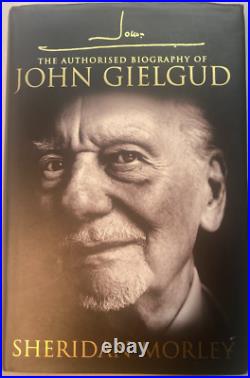
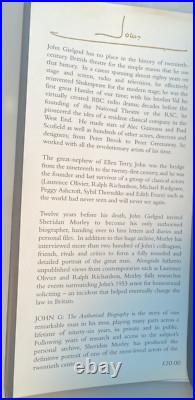
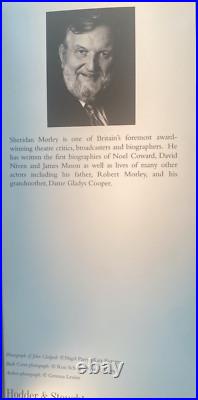
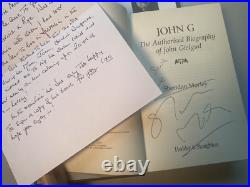
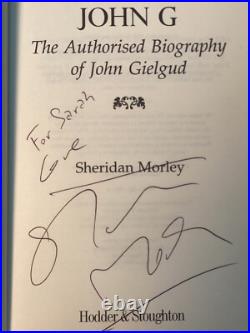
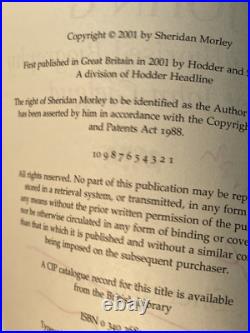
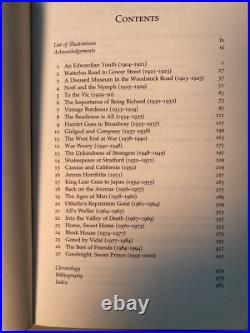
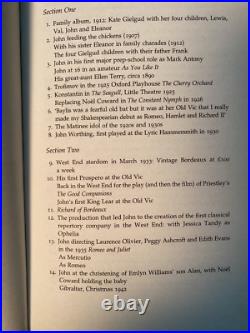
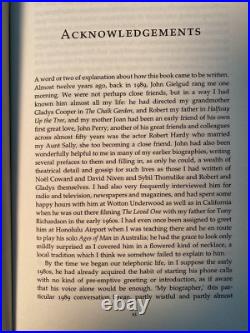
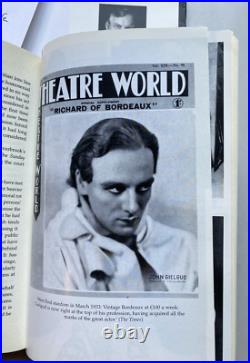
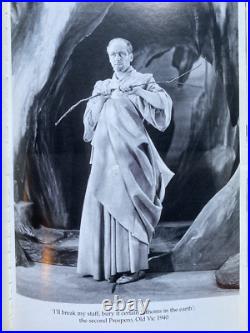
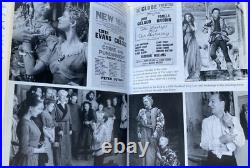
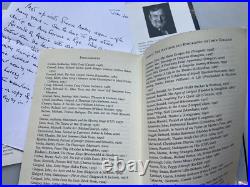

Offered: Signed First Edition "The Authorised Biography of John Gielgud" by Sheridan Morley Hodder& Stoughton, London 2001. Black boards gilt title on spine, dust jacket not price clipped, near fine, signed on title page "To Sarah Love Sheridan Morley" 510 pages includes a certain provenance letter related to the signing. Both dust jacket and book near fine. Sheridan Morley (Dec 1941- Feb 2007). Drama critic, journalist and biographer, he was steeped in British theatrical tradition.
Sheridan Morley, the drama critic, biographer and broadcaster was the third generation of a celebrated theatrical family. His father was Robert Morley, the famous character actor, and his grandmother was Gladys Cooper, who in her youth was one of the great beauties of her day and was, well into old age, a much sought-after actor in Britain and Hollywood. Sheridan was also a cousin of Joanna Lumley and brother-in-law of the actor Robert Hardy. In looks, he took after his outsized father, and when he grew a full Victorian beard he looked even larger.
Indeed, his size and a certain awkwardness could put people off him: a fellow reviewer grumbled about Morley bumping into him in the theatre. And while he was the theatre reviewer and arts editor of the old Punch from 1975 to 1989, guests at the weekly Punch lunch complained when they were seated next to him: when he turned to talk to the person on his other side, they were cut off from the rest of the table by the intimidating wall of the Morley back. He did not mean to be rude, unlike his father, also a Punch table member, who would make a display of removing his hearing aid when the conversation got boring, which it often did. Morley said his time at Punch was the happiest of his life. Certainly, benevolent editors allowed him to write books in the office.
He managed to produce an impressive list of biographies while he was there. These included Oscar Wilde (1976); Sybil Thorndike (1977); Marlene Dietrich (1977); Gladys Cooper (1979); Noel Coward (1979); Gertrude Lawrence (1981); Tales from the Hollywood Raj (1983); Katharine Hepburn (1984); Ingrid Bergman (1985); James Mason (1989); and Elizabeth Taylor (1988). At Punch, he was a colorful character who added something to the life of the office, not all of it pleasant. He walked about in stockinged feet and had an exceedingly loud voice, especially on the telephone. Once he was speaking to someone in New York and one of the women in the Punch library, which was across the corridor from his room, said: Next time I think he should use the telephone. Born in Ascot, Berkshire, he was named after Sheridan Whiteside, the self centred and demanding chief character in The Man Who Came to Dinner, who Robert was playing in the West End when Sheridan was born. It was an eccentric choice of name, but Robert displayed even more eccentricity when choosing a school for his son. He placed an advertisement in the personal column of the Times. Father with horrible memories of his own schooldays at Wellington is searching for a school for his son where the food matters as much as the education, and the standards are those of a good three-star seaside hotel. This way he found a liberal school run by Harry Tuyn, a Quaker Dutchman, in a country house near Aldeburgh on the Suffolk coast. This was Sizewell Hall, only a mile or two away from AS Neill's radical Summerhill in Leiston. When Sizewell Hall closed in the later 1950s, Tuyn started an English girls' finishing school in Château d'Oex, near Gstaad, in Switzerland, and Morley failed to complete his education. He had only O-level French, but by taking private lessons he was able to enter Merton College, Oxford, where he studied French and graduated in 1964.He took something of a wrong turning with his first job after leaving Oxford, as an ITN reporter and scriptwriter, but in 1967 he joined BBC2's new arts magazine program Late Night Line-Up, where he could demonstrate his interest in the theatre. He later presented Film Night on BBC2 before becoming deputy features editor of the Times (1973-75). Although he had no real desire to become an actor, he did appear on stage.
He was the narrator in Side by Side by Sondheim at Guildford and Norwich in 1983. He also devised a show called Noel and Gertie, a Coward and Gertrude Lawrence anthology in 1982 and Spread a Little Happiness, an anthology of Vivian Ellis in 1991. He turned his hand to directing, too, with Song at Twilight at the Gielgud in 1999; Where Are the Songs We Sang at the King's Head, Islington (2002), and four cabaret seasons at Pizza on the Park in London in the nineties.Morley also edited a number of theatre annuals and film and theatre studies, Punch at the Theatre; The Methuen Book of Theatrical Short Stories (1992); and The Methuen Book of Movie Stories (1993). All this work was fitted around his real job as a drama critic and broadcaster, and it is perhaps even more remarkable that some of it was done while he suffered a serious nervous breakdown and bout of depression when his first marriage broke down in 1987.
When he came out of this and left Punch for the Spectator, he resumed his output with biographies of Audrey Hepburn (1993); Gene Kelly (1996); Marilyn Monroe (1998); Judy Garland (1998), and the official biography of John Gielgud (2001). He also managed an autobiography, Asking for Trouble (2002). For many years he presented the Radio 2 Arts program on Friday nights.
